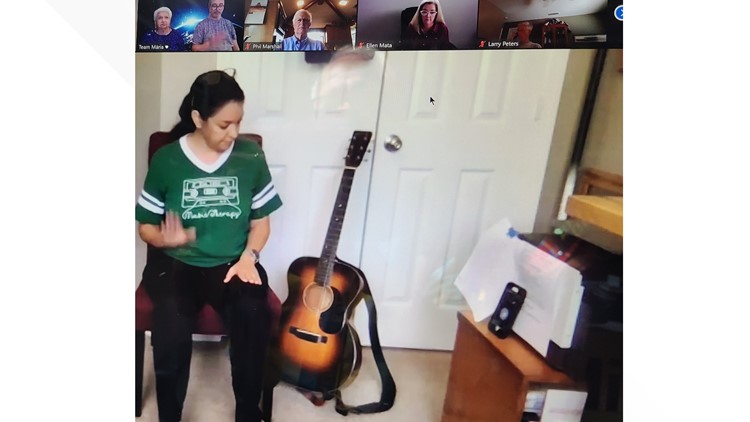Updated with additional details on Thursday.
The music therapy began on Zoom, the song being sung was at once plaintive, sweet and joyous.
“Let me call you sweetheart,” each pair sang together. “I’m in love with you.”
Each Zoom square held an Alzheimer’s patient and the patient's caregiver in what was one of two weekly therapy sessions put on by Casa De Vida, which is run by North Park Presbyterian Church.
The program launched 14 years ago to give Alzheimer’s caregivers a break from the unrelenting chore of taking care of their loved ones.
Those caregivers would bring their early to mid-stage dementia relatives to the church, and a trained volunteer would spend four hours with the patient. Meanwhile, the caregiver could take that time off.
Each year, 16 million people — spouses and family members — provide unpaid care to Alzheimer’s patients.
COVID-19 made human contact inadvisable, but Casa De Vida found a way to adapt the program to Zoom, even the music therapy component.
Working with Ellen Mata, who runs Casa De Vida for North Park Presbyterian Church, music therapist Carolyn Dobson devised a way to adapt her skills to Zoom. She runs the session from a room she’s equipped with cameras and microphones she’s adapted to compensate for the flatness of a computer image.
“It was difficult,” Dobson says. “In person, I can do a tactile cue. I can reposition instruments. They can see my face in 3D."
But now, people have adapted to her online sessions.
And the participants at Casa de Vida love her.
“This is the best thing that ever happened to me. It gives you a chance to engage it gives you a chance to learn, you hear about folks like yourselves, I and then we have these fabulous support people, the people who put this together and they are there with us," said Dick Casper. "They coach, they encourage, they are enablers. There couldn't be anything better than this."
Music, it turns out, can be an almost magic antidote to Alzheimer's disease. It can relieve stress, reduce anxiety and depression and reduce agitation, according to the Mayo Clinic.
Musical memories are often preserved in Alzheimer's because key brain areas linked to musical memory are relatively undamaged by the disease.
“In Alzheimer’s disease and different types of dementia, musical memory is surprisingly robust,” according to a 2015 research paper in the British journal Brain.
Watching one of Carolyn Dobson’s musical therapy sessions on Zoom, the faces of participants visually light up as she leads them through familiar songs of childhood.
She uses the verses from songs like “Let Me Call You Sweetheart” to focus their attention, spark their short-term memory and quiz them with tricks from the words they know.
Dobson also uses music to lead them through simple physical exercise. Shaking a container filled with beans in rhythm to the music can increase blood flow to the arms.
“Tapping toes is the number one exercise to prevent falls. It exercises the anterior tibialis that runs up the front of your leg," she said.
Dobson is “amazing,” says Mata. As director, Mata accepts applications for Casa de Vida.
Mata called the music therapist a "godsend."
Casa de Vida is open to anyone and is funded by Aware Dallas, a nonprofit which supports Alzheimer’s care programs in the community and the Agnes Kluth Foundation.
In times of COVID-19, Casa De Vida just gives participants and caregivers a one hour respite from pandemic incarceration once a week. It is 60 cherished minutes though.
“Ob-la-di, ob-la-dah, life goes on, ah,” Dobson sings to her group. “La-la-la-la life goes on.”



